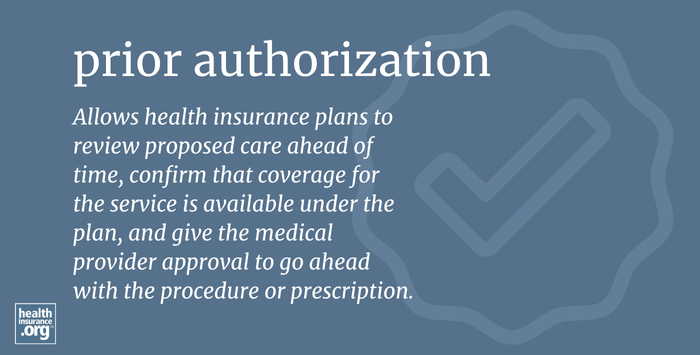
What is prior authorization?
Prior authorization, also known as pre-authorization or pre-certification, allows health insurance plans to review proposed care ahead of time, confirm that coverage for the service is available under the plan, and give the medical provider approval to go ahead with the procedure or prescription.
Prior authorization is used by health plans to ensure that only medical care that a plan has determined is necessary, effective, and cost-efficient is provided to its members, and that contraindicated care is not utilized. Prior authorization is also controversial, with both pros and cons: It does play a role in keeping medical costs down and promoting safe, efficient, and evidence-based care. But it’s also burdensome for medical providers and often results in patients experiencing delayed care or abandoning the care altogether.
Do all medical services require prior authorization?
No, not all services require prior authorization. Most private health plans use prior authorization to some degree, but the specifics vary from one health plan to another in terms of which services need prior authorization.
In general, the more expensive the service is, the more likely it is to have a prior authorization requirement. Treatment such as surgery and specialty drugs are likely to require prior authorization, whereas an office visit is not. But as is always the case, you should check with your own plan since each insurer sets their own rules for prior authorization.
Who initiates prior authorization?
The process of obtaining prior authorization from the health plan is usually initiated by the medical provider (doctor, hospital, etc.), but the patient is sometimes involved as well.
What will happen if I don't get prior authorization for a medical service?
Prior authorization is not a guarantee that a claim will be approved, but failure to obtain prior authorization for a service that requires it will generally result in a claim denial, even if the health plan would otherwise have covered the service.
What happens if a prior authorization request is denied?
Prior authorization denials can be appealed, and your doctor’s office is likely well-versed in how to respond to prior authorization denials.
It could be that the health plan just needs additional or revised information and will approve the prior authorization request once they receive it. If the prior authorization request was for a medication, the health plan might want to use step therapy, which means they could potentially approve the medication if you first try a less expensive option and it doesn’t work.
But it’s also possible that the health plan simply doesn’t cover the service in question, or that they continue to deny the request even on appeal. You can still obtain the service in that case, but with the understanding that your health plan won’t pay for it.
How is prior authorization regulated?
The Affordable Care Act prohibits non-grandfathered health plans from requiring prior authorization in order to see an OB/GYN who is in the plan’s network. It also prohibits health plans from requiring prior authorization for emergency services, regardless of whether the hospital is in-network or out-of-network.
Prior authorization requirements for treatment of mental health and substance use disorders cannot be more restrictive than the prior authorization requirements the plan has for other medical services.
States can set additional rules for prior authorization for state-regulated health plans (ie, plans that aren’t self-insured), and many have done so. These rules include limits on how long health plans have to respond to prior authorization requests, how appeals must be handled, and the qualifications of the prior authorization personnel.
In late 2022, CMS proposed new prior authorization rules that would apply to Medicare Advantage plans, Medicaid/CHIP plans, and qualified health plans sold through the federally run exchange / marketplace (HealthCare.gov). The rule was finalized in May 2024, albeit with a January 2027 effective date instead of the originally proposed 2026 effective date.1 The final rule will speed up the prior authorization process for Medicare Advantage, Medicaid/CHIP, and Marketplace plans, require it to be electronic, and make it more efficient and transparent.
Legislation calling for the same sort of reforms to the prior authorization process for Medicare Advantage plans unanimously passed the U.S. House of Representatives in September 2022, but was not taken up by the Sentate. The bill, titled Improving Seniors’ Timely Access to Care Act, has been reintroduced in 2024.2
Reforming the prior authorization system has been an ongoing effort. In addition to the multiple legislative attempts, CMS regulations have also been delayed over time. In 2021, CMS finalized a rule similar to one that was proposed in late 2022, but subsequently withdrew it. Ultimately, the regulations were finalized in 2024, but with a 2027 effective date.
Footnotes
- "Medicare and Medicaid Programs; Patient Protection and Affordable Care Act; Advancing Interoperability and
Improving Prior Authorization Processes for Medicare Advantage Organizations, Medicaid Managed Care Plans, State Medicaid Agencies, Children’s Health Insurance Program (CHIP) Agencies and CHIP Managed Care Entities, Issuers of Qualified Health Plans on the FederallyFacilitated Exchanges, Merit-Based Incentive Payment System (MIPS) Eligible Clinicians, and Eligible Hospitals and Critical Access Hospitals in the Medicare Promoting Interoperability Program" Federal Register; A Rule by the U.S. Department of Health & Human Services. Feb. 8, 2024 ⤶ - "Kaine Reintroduces Bipartisan Bill to Cut Health Care Wait Times for Older Americans" U.S. Senator Tim Kaine. June 13, 2024 ⤶
